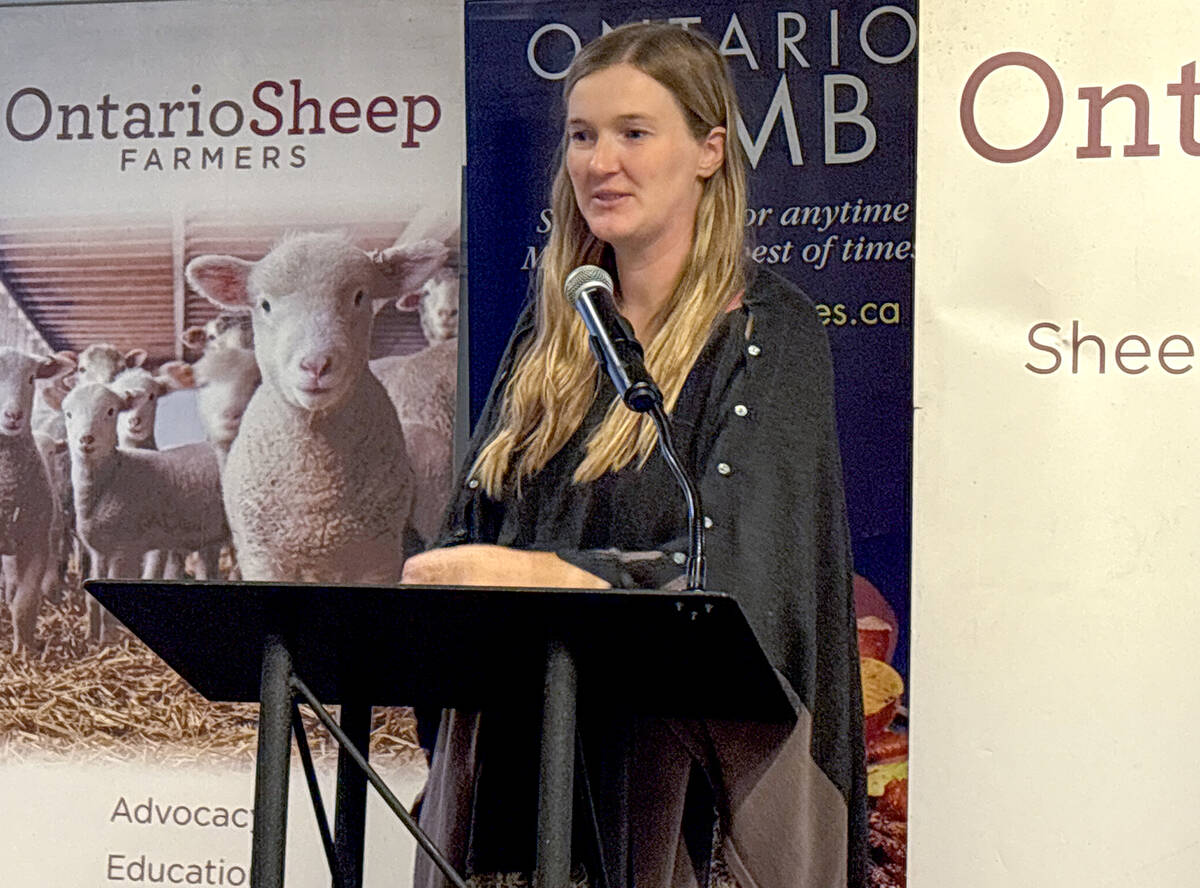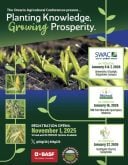The higher rate of interest and applications to agriculture programs globally reflects a shift in world priorities, Karen Taylor, director of Corporate Finance, Agriculture and Agribusiness at BMO, told attendees at the recent Advancing Women in Agriculture virtual conference.
“Agriculture is a very dynamic industry that needs to be readily adaptable to change,” she said. “Now, more than any other time, the interest in ag tech has never been so high.”
Why it matters: Agriculture provides attractive career entry points for professionals without previous exposure to, or experience in, the sector, including significantly more women.
Read Also

Footflats Farm recognized with Ontario Sheep Farmers’ DLF Pasture Award
Gayla Bonham-Carter and Scott Bade, of Footflats Farm, win the Ontario Sheep Farmers’ 2025 DLF Ontario Pasture Award for their pasture management and strategies to maximize production per acre.
“Investment in agriculture is strong, and conversations about climate change and sustainable agriculture are really coming to the forefront,” said Taylor, who is also an adjunct professor in agribusiness management and food policy at the University of British Columbia (UBC).
She highlighted four urban-raised women with careers in the agriculture sector.
Born and raised in Montreal, Gabrielle Menard’s only experience with agriculture was picking apples once a year. Now a commodity trader, the UBC Master of Food and Resource Economics (MFRE) graduate speaks to farmers daily.
Menard’s advice to women considering a career in agriculture is to “go for it.”
“It’s so interesting, and I keep learning every day,” said Menard. “[Agriculture is] such a wide sector, there’s so many jobs that we don’t think of when we start [post-secondary studies].”
She said weather, regulations and consumer trends impact prices and how producers farm.
“We’re trying to find inefficiencies in the market to make the market more efficient and make everybody happy in the process,” she said.
Paulina Gonzalez Miranda pursued her love of numbers via the economic and financial sector but graduated from UBC with a Master’s in Food and Resource Economics in part due to the influence of her uncle, a farmer.
“[The food and resource sector] has always fascinated me – the supply chain, the food system, international trade – it’s a very unique industry,” says the Semios market intelligence analyst. “It’s something that you plan every year, and farmers are price takers, so every component of the industry is very unique and very old.”
Gonzalez Miranda remains intrigued by the impact of consumer trends, governments, regulations, environmental concerns, and how her generation’s love of questioning systems shaped the industry and its market.
“If they’re (women) interested in technology, this is a very fast-growing industry,” she said. “There’s a lot of opportunities, and I’m pretty sure that everybody would be welcome.”
Lynn Kemper, Richberry Group of Companies executive vice-president of operations, dipped her toe into agriculture almost by accident when, as a pre-med student, she worked for an entomologist as a cranberry field worker every summer through university.
“It’s funny because growing up in the city, you don’t think about agriculture first, and I sort of fell into this job,” said Kemper.
After graduating and a five-month travelling stint, she began a full-time job at one of the cranberry operations and climbed the ladder from field worker to operations manager, overseeing the summer students’ Integrated Pest Management program.
Consumers are influencing the sector via their interest in food production and processing, said Kemper, now an executive vice-president in charge of several cranberry facilities in British Columbia and Quebec.
“Consumers want to make sure the food they’re consuming has been grown in a sustainable way, and the practices farmers are using are environmentally friendly,” she said. “Those trends are really evident right now.”
Sarah Sache’s skill set didn’t have an obvious fit when she married a Chilliwack dairy farmer. Her bachelor’s degree in Canadian studies focused on human geography and resource policy. However, she developed a keen interest in the dairy supply chain from production to consumer product experience and preference, and brought her insight to several dairy organizations. Sache, now vice-chair of the B.C. Dairy Association and director of the B.C. Agriculture Council, balances her board obligations with farm work and raising a family and believes sustainability for the sector extends beyond the field.
“You need to have people who can make good careers in agriculture, who can sustainably do the work that they’re doing,” she said. “All of those parts taken together is the way that I look at it and certainly advocate for around the board table.”
All four women encourage other women to pursue careers in agriculture, saying it’s a fast-growing industry whether interests lie in technology, supply chain management, business skills or more hands-on approaches.
“It’s rewarding, it’s exciting, and it’s a space where there’s lots of room for change and new and exciting things,” said Kemper.
Sache said the ag sector holds extensive opportunity and no shortage of jobs regardless of skill set.
“There’s so much space to grow, and that’s what I’ve enjoyed about it,” Sache said. “There’s all kinds of opportunity you can apply and extend throughout this sector and make a lot of positive changes and impact and growth.”
Taylor said embracing diversity, differing opinions and expertise in agriculture allow the sector to overcome challenges.
In 2020 BMO expanded its agriculture team to better serve clients’ needs and launched the Climate Institute, a virtual hub encompassing science, analytics, expertise and partners to provide a value-added resource and service focused on climate change adaptations.
Taylor said the group will also model droughts, floods and climate aspects that radically affect agriculture to help inform sector sustainability.
BMO’s Women in Business announced a five-year bond offering of $750 million to finance and lend to small and medium-sized, women-owned businesses or large businesses where women hold one-third of the company. BMO also expanded its women-owned grant program to award $200,000 to 26 female entrepreneurs.















